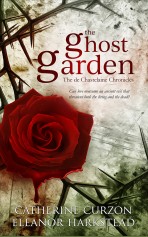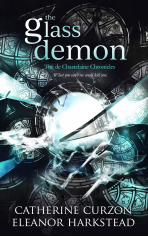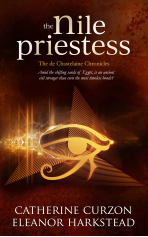1925
The gap between each floorboard seemed to call to Cecily. Drop the ring. But she gripped it even tighter.
She’d cleaned off the dirt after finding the ring in the rose garden. No one ever went behind the ancient brick walls, and Cecily had only braved its thorns and twisted branches to rescue a cricket ball. The pupil who had accidentally knocked it in there had cried, frightened of a telling-off, and Cecily hadn’t had to go far into the overgrown garden to retrieve the ball.
And there had been the ring, half-hidden in the ground as if it had risen up through the drought-parched earth just for her.
Cecily glanced over her shoulder, along the length of the corridor, but Hugh, her husband, was nowhere to be seen. Busy in his study, Cecily supposed as she knocked on the Culpecks’ door.
The late summer sun was dying, throwing a blood-red tide over the floorboards of the masters’ quarters and she knocked again, keen to be in the cozy confines of the Culpecks’ rooms. Somewhere, someone was tuning a piano and she could hear the occasional sound of leather on willow from the playing fields outside, where school life went on as it ever did, as it ever had since she could remember. She was part of the fabric here, as constant as the buildings themselves.
“Close the curtains,” Harriet instructed from inside the rooms. “Our circle is now complete.” The bolt slid back with a metallic thud and the door opened to reveal Harriet Culpeck, her yellow summer dress a flame in the gloom. She smiled and said, “I was worried you’d thought better of it!”
“No, not at all!” Cecily stepped inside. Harriet’s curious glance fell on Cecily’s knitting bag. “Just in case the spirits are quiet, I have a pullover I’m knitting for Hugh, you see.”
“Graham has a meeting with the headmaster,” Harriet explained as her husband appeared on the threshold of the sitting room, struggling to find the sleeve of his dark gray suit. He greeted Cecily with a warm smile, as different from Hugh as any man could be. “It’ll just be you and I.”
The headmaster. Never ‘Hugh’, never ‘Mr. James’, always that stern-faced, rheumatoid-eyed headmaster, even to the people who have known him all these years.
“Good evening.” Cecily nodded. “I hope your meeting goes well.”
His look was one of sympathy, the same look the world had given Cecily all her thirty years, when the world looked at her at all. Then Graham fastened his jacket over his rounded belly and said, “And your circle of two.”
“We shall see—perhaps it will be more by the end of the evening. There might be quite the party going on by the time you get back!” But Cecily still clung to her knitting bag. Until the bolt was drawn on the door, she couldn’t trust Hugh not to arrive unannounced. He would be extremely displeased to know that Harriet was holding a séance in the masters’ quarters. And even more so if he knew that Cecily was taking part.
“We shall be one hour,” Graham told them, holding up his index finger. Cecily nodded an acknowledgment as the clocktower chimed its mournful six bells. When the clock chimed again, the headmaster would stalk along the narrow, dark corridor that led to his study, his black cape billowing at his back. He would descend the wide staircase into the oak-paneled hall and make his way over the courtyard, through the archway and around the path—never over the grass—toward the rooms she shared with him.
And she must be at home to meet him.
Harriet presented her cheek for a kiss, then Graham was gone. She slid the bolt back into place and asked Cecily, “You have the ring?”
Cecily put her knitting bag down behind the sofa, then held out her palm to Harriet. The gold ring, with its inlaid pattern of white and dark red stones, shone in the dim light.
“I managed to get the dirt out of the inscription this afternoon—it says ‘My love, my secret’. And then a letter C. I suppose an antiques dealer would know how old it was, but they couldn’t tell us who this C is, could they?”
Cecily glanced expectantly toward the séance table. Or dining table. She had never been to a circle before but whatever Cecily had been expecting, it hadn’t been a cheery crochet square in the colors of the rainbow, nor a bowl of russet apples beneath the pink lampshade, its tassels blowing a little in the breeze that fluttered the closed curtains. Two stubby candles already burned, settled into green saucers, and a steaming teapot sat next to the bowl, alongside two cups and a milk bottle.
A milk bottle on the table. She couldn’t even imagine what Hugh would have to say to that.
“Would you like a tea before we start?” Harriet held out her hand. “Can I see the inscription? How romantic, a ring in a rose garden!”
Cecily nudged the ring into Harriet’s palm. “Yes, it is romantic, isn’t it?”
Romance was lacking so entirely from Cecily’s life that she wondered if it was just something made up for songs, books and films, a lie to cling to. Harriet squinted at the inscription and gave a sigh of appreciation before she handed it back.
“I’ll pour and we can start!”
Cecily held the ring tight once more. It had become her little piece of treasure, something she wrapped in a handkerchief and kept under her pillow. Hugh knew nothing of it. If he did, he would send it to the auctioneers in Tiverton. But it was hers—the one little piece of romance that had fallen to her.
She pulled out a chair at the dining table and sat down, her chin in her hand. “I wonder if the C stands for Caroline?”
“Once we’ve reached your brother, God rest him, we can ask!” Harriet took her seat and poured out two cups of tea. Then she clasped her hands in front of her breasts and told Cecily, “We’ll start with a prayer.”
Cecily placed the ring down in the center of the table and pressed her hands together. Sitting around the table, she and Harriet looked as if they were about to say grace before dinner, rather than contact the dead. Together they recited the Lord’s Prayer as the candle flames fluttered and the curtains moved gently. Then Harriet reached her hands across the table and offered them to Cecily.
“We mustn’t break the circle until we’ve said goodbye,” Harriet told her. “Ready?”
Cecily took her hands. She would grip on for dear life, because what would she do if Sandy got trapped in limbo, or wherever it was spirits went if the circle broke too soon? “I’m ready.”
Harriet tossed her head to throw her graying copper curls from her eyes, then closed her eyelids. She took a deep breath, then another, and asked in a clear voice, like the dorm matrons ordering the boys into line, “We wish to speak with Lieutenant Pincombe. Sandy. Are you there, or is anybody with us who can call Sandy forward?”
Cecily stifled a sob. She’d promised herself not to cry, but the thought of her poor brother lying cold in the cemetery outside Ypres for a decade was too much to bear. Though she hadn’t cried when news had reached them that Sandy had been killed. Her father hadn’t allowed it.
“Sandy, it’s me, it’s Cecily. Please talk to us.”
The mantelpiece clock ticked on, counting out the empty seconds. The sound of the piano had stopped and, into the silence, Harriet called, “Can anybody come forward? Sandy or perhaps the lady who lost her ring in the rose garden? We’d love to know who gave you such a pretty trinket. Who was C? Were you one of the Whitmores of Whitmore Hall?”
One of the candles guttered, the flame sputtering and dying as though someone had passed a breath across it. Then it flared again, the wick spitting back into life.
“Is there a Whitmore with us?”
Thump.
Cecily jolted and almost let go of Harriet’s hands. Cautious, she asked, “Is that a footstep, Hattie? What is it?”
Harriet’s fingers tightened and she gripped onto Cecily as her eyes sprang wide open and her mouth grew slack. As Cecily watched, her friend began to work her jaw as though chewing tough leather, then she asked, “What ring?”
Yet it wasn’t Harriet’s voice at all, but a rasping, low, male voice. A voice that sounded as though it hadn’t been used in a very long time. It sounded like alcohol and tobacco and a stern loathing that Cecily had heard from her father, just as she heard it from her husband and now from this unnamed, uninvited visitor.
“Answer me, my girl.” Harriet stared at her, unblinking. “Whose whore are you?”
“I’m not anybody’s…” Cecily swallowed, her throat dry with alarm. Her voice had become tiny again. “Not anybody’s whore. I’m not.”
“Don’t take it!” Harriet’s voice was a scream of terror, a woman’s scream, high and shrill. Her hands were so tight on Cecily’s now that her knuckles were white as bleached bone. “No!”
“Take what? The ring?” Cecily implored Harriet, or whoever was speaking through her. This wasn’t what Cecily had hoped for when she’d agreed to sit in Harriet’s circle.
“Keep it safe,” the woman’s voice implored. “Keep it from him.”
“I will, I promise.” Though Cecily had no idea who him was supposed to be. “Is it yours? Are you C?”
“Shh.” Harriet looked over her shoulder, as though listening for someone. Cecily found herself listening too, her heart pounding at the approach of whoever the woman was so afraid of. The clock ticked again and Harriet leaned forward across the table to whisper. “Isabella.”
Cecily recognized the name. She closed her eyes, trying to recall where she had heard it in relation to Whitmore Hall. Of course, the memorial inscription on the floor of the chapel.
Isabella Whitmore, whose earthly remains lye interr’d elsewhere, under her husband’s connstant gaze untill the Daye of Judgement.
Isabella, the woman whose own husband had tried her and found her guilty of murder.
A chill rushed through Cecily. Whyever had she agreed to this? Her brother had not spoken, and instead Harriet had managed to dredge up a dark, dark episode from the old days of Whitmore Hall. Long before her grandfather had bought it and turned it into a school.
“Find me,” Isabella’s voice implored. “And let us rest as one.”
The candle flames flared again then went out, plunging the room not into the gloomy sunlight that the curtains should allow, but an inky blackness, darker than any night she had ever seen. Cecily willed herself not to move, not to cry out as the hoarse rasp of the man’s voice sounded again and told her, “I am always watching.”
Cecily shivered. It sounded just like Hugh. Could it really be that Harriet had made contact with the dead, or had she managed to read what lay hidden in the depths of Cecily’s mind?
“You leave her be, you bully!” Cecily said under her breath. Yet she could be entirely alone in the room if not for Harriet’s grip on her hands. The clock was silent, the birdsong too, and here they sat in this sudden, unexpected tomb, watched by whoever possessed that ancient, cobwebbed voice.
“Sorry to interrupt, but the door was open,” a new voice said in an accent that she didn’t recognize. For a second Cecily readied herself for a new horror but instead a match sparked into life and the candles were illuminated. As though someone had flicked a switch, the clock resumed, the piano sounded and outside the window with the billowing curtains, a bird was singing.
Cecily blinked against the light and saw a man in the doorway. She had no recollection of ever having seen him before. He was rather short, an imp of a man, with an uncombed thatch of tousled dark hair and bright blue eyes. He was grinning—beaming in fact.
And he was handsome.
Still holding on to Harriet’s hands, Cecily gave him a polite nod to mask her mounting surprise. “Good evening. And you must be…?”
“Rafael de Chastelaine. Raf. They tell me you’re having a problem keeping your Latin masters?” As he replied, Harriet sucked in a gasp of air as though she had just been revived after drowning. She released Cecily’s hands, just as she had told Cecily not to do. As she did, Raf took a step into the room and pressed his hand to his crumpled shirt, holding it over his heart as he told the unseen visitors, “Thank you, spirits, for joining us, go safely on your way. Lord grant peace to us and those who speak here.”
He recited it as though it had been learned by rote, his accent lending the words a strange flamboyance, a world away from the hideous rasp of the spirit. Then he dropped his hand and Cecily realized that the new arrival wore no tie.
Hugh won’t like that at all.
“I am so, so sorry!” Harriet settled her wide gaze on Cecily. “Did we get anyone, Cecily? Did your brother come through?”
Cecily stared at her open-mouthed. “Did you not… You couldn’t hear what you were channeling?” Maybe it was better to pretend. She could tell her that Sandy had said hello, and that he was playing cricket in Paradise with the shade of W.G. Grace. But no, she couldn’t lie to Harriet—she had few enough friends as it was. “A gentleman and a lady came through. He sounded angry. And she said her name is Isabella.”
Cecily took the ring from the table and held it safely in the hollow of her palm once more. She offered the new arrival a smile. “Sorry.”
“Did your bro—” Only then did Harriet seem to notice the crumpled Latin teacher in the doorway. She rose rather shakily to her feet and said, “Did my husband let you in?”
“The door was wide open!” Raf repeated, still beaming. He gave a very polite nod of greeting. “I’m a day early but there wasn’t a reply from Dr. James’ rooms so I thought I’d give his deputy a try instead!”
The bolt was fastened, Cecily remembered, a chill running through her again.
“Graham— Mr. Culpeck, the deputy headmaster, is with Dr. James.” Harriet rose to her feet and quickly swept the curtains open, flooding the sitting room with welcome light. There was a giggle in her voice, an obvious note of excitement at this new arrival who seemed so untypical of the men of Whitmore Hall. “This is Mrs. James. Cecily—Mrs. Headmaster!”
Cecily rose from the table and, with a confidence she didn’t feel, approached the new arrival. “How do you do, Mr. de Chastelaine? Have you traveled far? We are rather tucked away in our corner of Exmoor—I trust you did not have too many difficulties finding your way here.”
“All the way from the Yorkshire coast,” he admitted, though he didn’t sound like any Yorkshireman Cecily had heard before. “By way of Romania, in case you were wondering if this is a typical Yorkshire accent!”
“Romania?” No White Russian emigré, then. “My goodness, I don’t believe I’ve had the pleasure of meeting someone from your country before. You are very welcome here in Devon, Mr. de Chastelaine.”
“I’ve been wandering around the grounds,” he admitted in a conspiratorial whisper, as though it was quite the shocking confession. “It’s a beautiful place.”
“Mrs. James was born here.” Harriet beamed. “Tea, Mr. de Chastelaine?”
He to/pok a battered silver pocket watch from the pocket of the rather rumpled tweed jacket he wore and opened the case with a flick of his thumbnail. “I wouldn’t want to hold you ladies up.”
Cecily glanced at her watch. “We have twenty minutes.”
“Mrs. James is a marvel in the gardens.” Harriet smiled and Cecily couldn’t help but return it, because she knew her friend well enough to recognize the embarrassment in her bluster. She had been caught in her séance by this newcomer, and she felt rather silly about it. “Cecily, dearest, why don’t you show Mr. de Chastelaine the grounds before he meets the headmaster?”
Cecily’s heart blanched at the very thought of it, the idea that she would stroll alone at dusk with a man, any man. She had been punished for far less over the years.
“I can show you from the window, if you’d like. There’s something rather special for you to see, actually.”
Maybe Mr. de Chastelaine would be interested in what Cecily had spotted, even if her husband had not been. Yet Harriet wasn’t about to let the matter drop so easily and suggested, “Oh, you can’t see anything at twilight! Take Mr. de Chastelaine to see the gardens, Cecily.” Then she patted Cecily’s arm. “They never end their meetings early. Nobody need know.”
Something in Harriet’s voice implied, I won’t tell. But someone else might if they saw Cecily and the substitute teacher through the school’s many windows.
“If you should like to see the grounds quickly, then I have no objection in showing you, sir.”
“Really, call me Raf,” he told her. “And I’d love to see the grounds with you. Don’t tell, ladies, but gardening’s what I do these days. Gardening and enough Latin to help a mate in need!”
Nerves. That’s what Hugh had said was wrong with Mr. Brennan when he went off in his father’s car, whiter than anyone Cecily had ever seen in her life. It’s always nerves. Mr. Brennan had nerves, she had nerves. Nerves were for weak people, Hugh always said.
Where on earth did the bookish Latin teacher meet this man, though? They hardly seemed to be from the same planet, let alone be mates.
“This way please, Mr. de…Raf.” Cecily gestured toward the door. Over her shoulder, she said, “Thank you, Harriet. That was certainly…interesting. Oh, I nearly forgot my knitting bag!”
Cecily’s emergency excuse sat behind the sofa, and she hurried to pick it up, the ring still clutched in her other hand.
“Never break the circle,” Raf told Harriet with a very mischievous wink indeed. Not the sort of wink that one saw in a school intended to turn out middling cabinet ministers and respectable bastions of the civil service. In reply, Harriet giggled and held her hand to her lips like the girl she had once been. Her giggles grew a little sillier when Raf added, “You never know who might be knocking about.”
















 Facebook
Facebook Twitter
Twitter